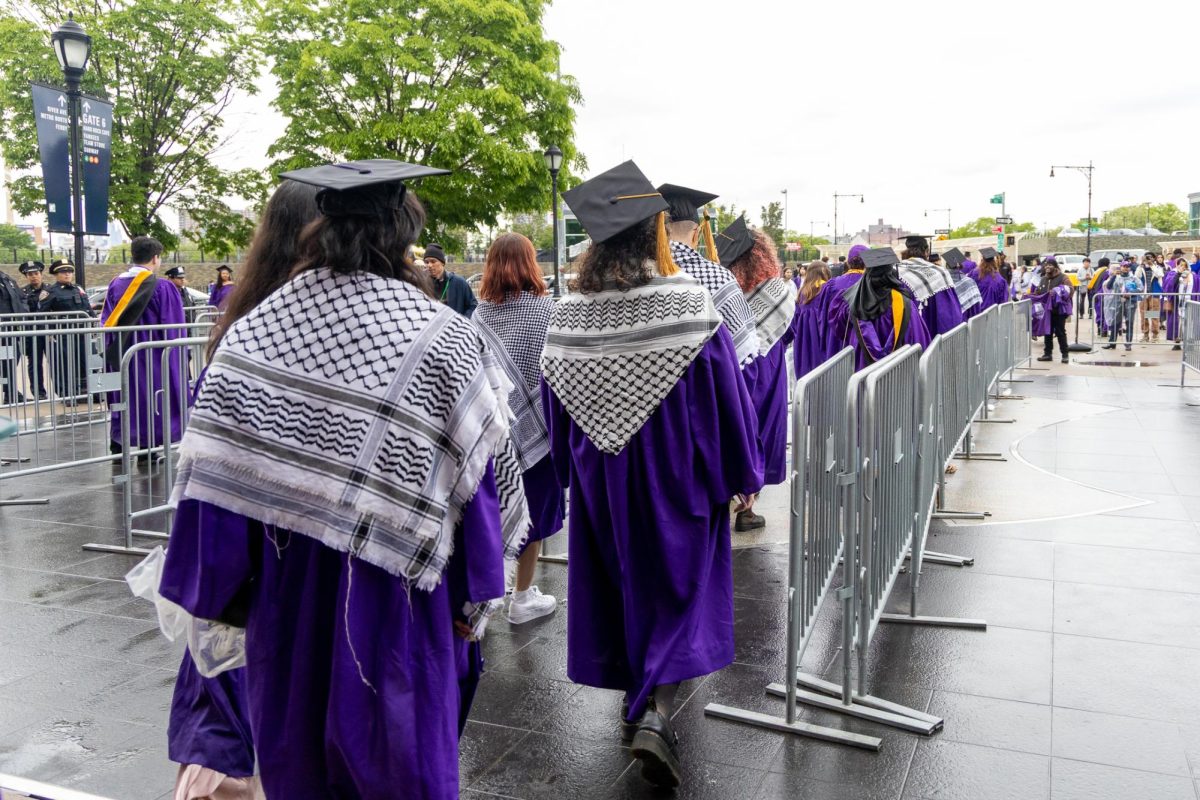Graduating GSAS students are barred from wearing “decorated caps, sashes, stoles, cords, pins, scarves” at their school-specific convocation ceremonies due to “safety and security” concerns, administrators told students in a Thursday email. The convocation team also said that they will halt the event if any graduate “attempts to disrupt” the procedures, following a wave of pro-Palestinian demonstrations at graduation ceremonies last year.
Before entering their respective ceremonies, master’s and doctoral students at NYU’s Graduate School of Arts & Science will be required to remove any adornments to the standard gowns, hoods, caps and tams, according to the email. The restrictions — which echo controversial regulations at NYU Abu Dhabi’s commencement ceremony last spring — detail that students who “display any signs or banners” during the ceremony will be “promptly removed” from the venue and the event will end.
“GSAS believes strongly in the dignity and purpose of these ceremonies,” the email stated. “While we understand your pride in your nation of origin, your culture or your personal convictions, we are obligated to protect the safety and security of everyone attending.”
An NYU spokesperson did not respond to requests for comment regarding potential restrictions at other schools’ graduation ceremonies.
A faculty member with connections to the school’s convocation committee, who requested to remain anonymous due to fear of retaliation, said that GSAS dean Lynne Kiorpes drafted the new policy on attire and poster restriction in a “top-down dictatorial directive” without taking a vote from the convocation team at large. The faculty member also said that several members of the committee raised concerns that the new policy would violate students’ freedom of expression.
“I’m shocked at the casual nature of all of this and how so many people in upper administration — whose job it is to protect the students — just don’t even bat an eye at this,” the faculty member said in an interview with WSN. “There is a serious lack of leadership in this when it comes to how to protect the civil rights of our students.”
The faculty member said that when Kiorpes introduced this year’s additional restrictions, she referenced that President Linda Mills and other administrators were “pissed off” after convocations last spring saw students wearing keffiyehs, carrying signs and chanting in protest of the war in Gaza. At last year’s all-university commencement at Yankee Stadium, dozens of graduating students similarly walked out and protested outside while Mills delivered her address.
After NYU Abu Dhabi imposed similar restrictions at its commencement last year, barring graduates from decorating their caps and gowns or displaying “flag-like attire,” Emirati authorities allegedly detained a Ph.D. student who waved a keffiyeh and shouted “free Palestine” while crossing the stage. A NYU spokesperson had attributed the restrictions to “local laws” and said the university has “no authority” over the immigration or law enforcement at its global sites.
This spring’s universitywide guidelines for graduation ceremonies stipulate that forms of peaceful protests, such as holding signs or wearing flags, are “typically permitted” during the event — with the exception of those that violate NYU’s Non-Discrimination and Anti-Harassment policy, which controversially cites “code words, like ‘Zionist’” as a form of potentially discriminatory speech. The guidelines also recommend that commencement speakers convey that the “free exchange of ideas and open inquiry are bedrock principles” of the university.
“The 10,000-pound elephant in the room is, ‘How do we discriminate against these students without discriminating openly,’” the GSAS faculty member said. “The decision to suspend our civil rights and collectively punish everyone if anyone shows any sort of cultural expression is directly a function of anti-Palestinian racism.”
Graduate Student Council senator Isabella Angeles said that the new policy prevents students from celebrating their achievements with loved ones and that she is uncertain about whether she can wear her student council stole at the ceremony. She said these restrictions set a “bad precedent” that limits freedom of speech, especially at a school like NYU with a substantial population of international students.
“It’s a blatant disregard for what’s going on, because how can a student wearing a stole or a country flag put someone in danger?” Angeles said in an interview with WSN. “NYU is just trying to put a Band-Aid on something that they know is going to happen instead of addressing why students feel the need to protest.”
Contact Amanda Chen at [email protected].






















































































































































